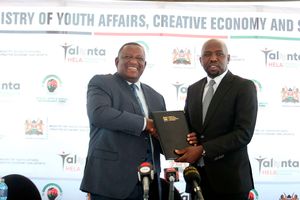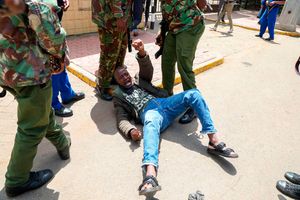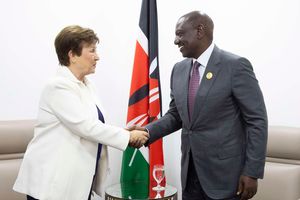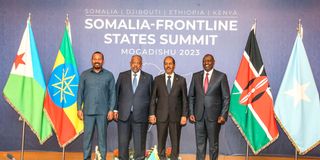
From right: Kenya’s President William Ruto with his counterparts Hassan Sheikh Mohamud of Somalia, Djibouti’s Ismail Omar Guelleh and Abiy Ahmed of Ethiopia in Mogadishu on February 1, 2023, for a regional meeting on efforts to stabilise Somalia and eradicate terrorism.
The Sudanese government’s open letter to the Kenya Parliament accusing President William Ruto of aiding the Rapid Support Forces (RSF) to propagate atrocities in Sudan has exposed Nairobi’s standing as a peacemaker.
Other than Sudan, the Democratic Republic of Congo (DRC) President Felix Tshisekedi has also come out to accuse President Ruto’s administration of interfering with the political situation in his country by openly hosting the M23 rebels to cause instability in the country.
The accusations against Kenya by the two countries have raised issues whether Nairobi has fallen from a peace broker, it has been known for, to a meddler-in-chief and a warmonger keen to destabilise the region.
Read: Ruto: Terrorists used banks from Kenya, Somalia and South Africa to fund DusitD2 terror attack
Reform strategist and policy thinker Prof Peter Kagwanja and city lawyer, Mr David Ochami, believe that President Ruto’s pronouncements and actions made Kenya lose in its quest to have Mr Raila Odinga become chairperson of African Union Commission as well as its shine as an honest neutral broker in the East African region.
The two singled out President Ruto’s comments on the Sahrawi issue, the Democratic Republic of Congo (DRC) crisis, his infamous phone call with France President Emmanuel Macron in the wake of Goma's fall to M23 rebels as well as his behaviour on Sudan, Russia-Ukraine crisis and Israel's war with Hamas.
“Kenya’s loss in the AU Commission contest should have been a wake-up call for Kenya to return to its Africa-centered foreign policy based on national interests,” says Prof Kagwanja.
Mr Odinga lost the AUC to Djibouti Foreign Minister Mahmoud Youssouf.
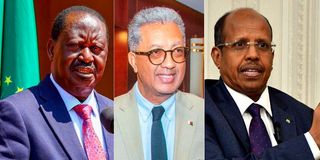
From left: Candidates for the African Union Commission Chairperson Raila Odinga (Kenya), Richard James Randriamandrato (Madagascar) and Mahmoud Ali Youssouf (Djibouti).
The letter of March 14, 2025 by the vice president of the Transitional Sovereign Council (TSC) of Sudan, Commander Malik Agar challenges Kenyan MPs to put pressure on President Ruto to expel RSF leaders from Kenya and not to allow the president to interfere in Sudan's internal affairs.
RSF is led by Mr Mohamad Hamdan Dagalo alias Hemedti.
Mr Agar’s letter referenced; “grave concern regarding the hosting of meetings by the RSF militia on Kenyan territory” came as the relations between the two previously neighbouring countries before South Sudan broke off from Khartoum, at their lowest ebb.
The letter goes on to accuse Kenya’s leadership of covert business deals with Mr Dagalo and the support for the rebels fighting the Sudanese government.
“I trust that your esteemed Parliament will uphold the legacy of Pan-Africanism and will not permit Kenyan territory to be used to legitimise or host entities intent on undermining a neighbouring African state,” said Mr Agar.
Khartoum has accused Nairobi of helping to foment the violence in the North African country, which has since seen Sudan ban imports from Kenya- largely the Kenyan tea and coffee in a blow to the East African nation’s source of revenue.
Mr Ochami notes that Kenya’s meddling in the Sudan crisis may have infuriated Ethiopia, whose Prime Minister Abiy Ahmed was already mediating a peace process.
“President Ruto began entertaining and inviting the RSF leaders when Mr Abiy was trying to mediate the Sudan crisis, which had the effect of scuttling that mediation,” says Mr Ochami.
President Ruto’s Kenya Kwanza regime has in the recent past come under increasing pressure over its role in stabilizing DRC more so, in the wake of the activities of the DRC rebels and opposition politicians apparently operating in Nairobi.
Nairobi scheme
In 2023, M23 rebel leader Mr Bertrand Bisimiwa, and former election chief Mr Corneille Nangaa, publicly launched in Nairobi, Kenya’s capital, the Congo River alliance, a political-military alliance whose objective is to dethrone DRC President Felix Tshisekedi regime.
The launch, which happened just days to elections in the conflict- ravaged country, caused a diplomatic spat between Kenya and DRC, the two East African Community (EAC) states.
DRC, irked by Kenya, recalled its envoy in Nairobi for “consultations” as it summoned the Kenyan ambassador in Kinshasa.
The M23 rebel group continues to cause instability and deaths in the mineral-rich Eastern DRC with Goma town falling to them.
Mr Nangaa, an opposition politician in DRC, is the former head of the country’s electoral commission and is said to be exiled in Kenya.
Mr Ochami says that to make matters worse, President Ruto blundered by announcing that he had talked to French President Emmanuel Macron on the Congo issue, well aware that the Francophone countries in Africa are disassociating with France militarily and linguistically.
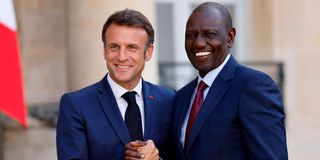
French President Emmanuel Macron (left) shakes hands with Kenyan President William Ruto as he leaves after their meeting at the Elysee Palace, amid the New Global Financial Pact Summit in Paris on June 23, 2023.
“You recall that in 2023 the Congo River Alliance to which the M23 belongs was, publicly, launched in Nairobi. You can't expect DRC and other African states to have favours with Kenya and Ruto for this misconduct,” said Mr Ochami, a position that was shared by Prof Kagwanja.
Early this year, President Tshisekedi rebuffed mediation efforts by President Ruto to find a solution to the crisis under the auspices of EAC that the Kenyan president currently chairs.
President Tshisekedi’s position while accusing Nairobi of insincerity towards a peaceful settlement in Goma, saw the matter co-handled with The South African Development Community (Sadc).
“The president could have avoided that gaffe. It was not enlightening,” said Prof Kagwanja.
Rwanda’s President Paul Kagame has also accused Kenya of negatively personalizing EAC’s mediation of the crisis in Eastern DRC.
“It doesn’t rain; it pours! DRC President, Tshisekedi, accused Kenya of siding with Rwanda and being too soft on the M23 rebels, and turned to Sadc for military support and to Angola for mediation,” said Prof Kagwanja.
"Uncomfortable truth"
Mr Ochami observes that “historically, much of Africa has distrusted Kenya for either sitting on the fence when needed most or supporting anti-Africa causes including during the fight against apartheid.”
“Its apparent President Ruto has come to symbolise much of what many African states distrust Kenya for. To that extent President Ruto in a way, especially in the DRC crisis sabotaged Kenya’s AUC bid,” Mr Ochami says.
The city lawyer revealed that many regions in the EAC are also uncomfortable with Kenya acquiring more clout than she already has and that a number of African leaders cannot stand that.
“With President Ruto’s tweet that Israel needs protection against terrorists, where he seemed to take sides in the on-going Israel- Palestinian crisis, Kenya could hardly count on the support of the 19 largely Muslim States in Africa in Mr Odinga’s bid for AUC,” said Prof Kagwanja.
Prof Kagwanja reveals that “this hard-hearted comment was also highly impervious to the collective position of African Union (AU), that runs AUC in terms of policy formulation and oversight, which backs a two-state solution to the world’s most protracted and deadly crisis.”
Sadc led by South Africa took a different tangent to Kenya’s in the Israel- Palestine crisis, accusing the former of fermenting genocide in Gaza strip in a landmark case filed at the International Court of Justice (ICJ) that sits in Netherlands.
The president’s comments that Israel requires protection from terrorists appeared to go against the AU push for a two-state solution to the crisis between Israel and Palestine.
“His comments on Israel and Palestine were not helpful,” says Prof Kagwanja.
Tellingly, Palestine President Mahmoud Abbas was an honoured AU guest in Addis Ababa during the election on Saturday and was afforded an opportunity to address the AU leadership.
Foreign Affairs Principal Secretary Korir Sing’oei sought to explain the role of Nairobi in peace mediation in the Great Lakes region.
“The evidence and facts clearly points to our position and contribution to achieving peace and stability in the region. Again those who want to criticise for the sake of it are at liberty. On Sudan, we’ve been at it since Day one though AU and Igad. We have granting space to all factions, to General Fattal al Burhan to Mohamed Hamdan Dagalo aka Hemedti and civil society to meet in Nairobi and find a lasting solution, how do we become meddlers? The same is true for DRC through the Nairobi process.
“We are the ones who insisted that no meaningful peace process cannot be achieved when M23 is not in the negotiating table a position that Kinshasa wasn’t too happy with. You don’t achieve peace by isolating others. Still on DRC, remember we offered the buffer between M23 and FDRC though the KDF to buy time for the factions to talk. We only left after DRC declined to extend our term. There had been calls that we join conflict as combatants, which we declined.”
Dr Sing’oei says peacemaking is not a tidy process.
“It means you engage everybody, even the guys who are not clean themselves because that’s the nature of armed conflict,” he told the Daily Nation.

